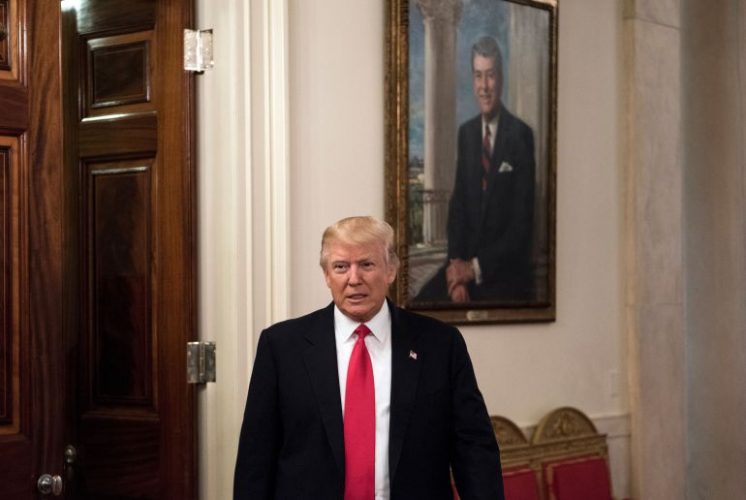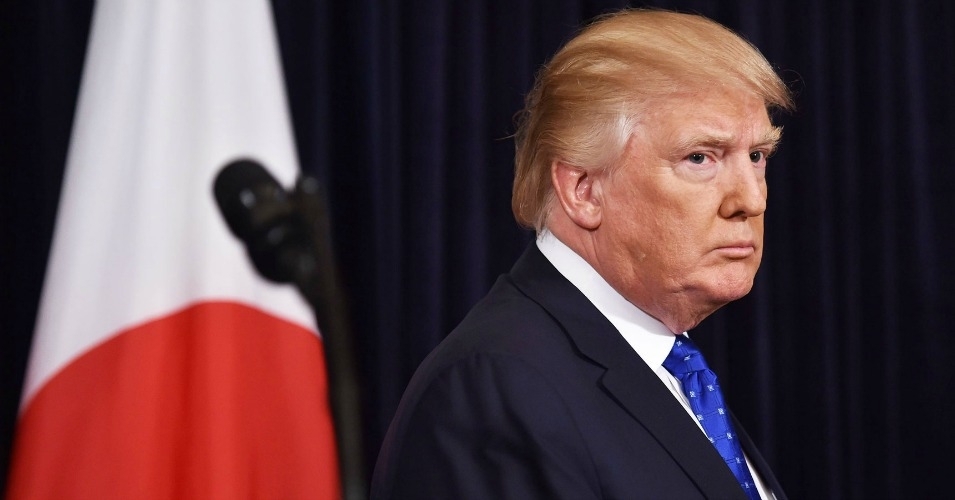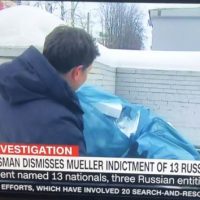Agency officials say measures have been taken to isolate leakers, creating a culture of fear.
National security officials across the federal government say they are seeing new restrictions on who can access sensitive information, fueling fears in the intelligence and security community that the Trump administration has stepped up a stealthy operation to smoke out leakers.
Officials at various national security agencies also say they are becoming more concerned that the administration is carefully tracking what they’re doing and who they’re talking to — then plotting to use them as a scapegoat or accuse them of leaks
One U.S. official voiced concern over even talking to their superiors about a benign call from a reporter. The agency this official works for had started limiting staff’s access to information, they said, and it would make it far easier to figure out who was talking to people in the media.
There was suspicion, the official said, that the agency was even tracking what they printed, to keep tabs on what information they were accessing.
“I’m just trying to keep my head down,” another U.S. intelligence official recently told POLITICO.
A half dozen officials across the national security community described to POLITICO a series of subtle and no-so-subtle changes that have led to an increasingly tense and paranoid working environment rooted in the White House’s obsession with leaks.
President Donald Trump has regularly vented about his intense frustration with anonymously sourced stories, and has specifically targeted federal government entities, including intelligence agencies like the CIA and FBI and the State Department.
That the White House itself leaks to reporters was something of a joke in the administration’s early months in office. But after Trump grew angry about leaks earlier this year, “there was something of a crackdown” inside the White House, one senior administration official said.
There was a particular frustration in the White House about the investigative and national security leaks — along with the details of Trump’s foreign phone calls — that led White House officials to call the FBI and ask for leak investigations.
The reverberations have spread in the weeks since, and several national security officials outside the White House have spoken of a strategic thinning of the ranks — limiting the number of people even read into certain sensitive matters, so that if something leaks, the suspects are obvious.
“The circles on this are so small,” one U.S. intelligence official said of the various Russia investigations that have cast a shadow on Trump’s White House.
Information on Trump and Russia has been so limited there would be fewer and fewer sources, the official said, putting those who are talking at risk. “Confirming [Russia news] is almost impossible,” the official said.
In some cases, the official added, information has been so “choked down” that if something comes out in the press, “it’s either a bogus leak” or, the official said, the relevant agency will know exactly where it came from. And, the official said, they had heard several other government organizations had started doing the same.
The concern isn’t limited to official communication channels. As Trump himself continues escalating his war with the media, how far the administration would go to keep tabs on the workforce is an unsettling unknown.
“There’s an increasing concern that they may be moving beyond monitoring official communications,” the second U.S. official said. It’s “likely the case,” the official said, that the administration could be tracking the personal communications channels of federal employees — especially those close to the White House — including personal email accounts.
White House press secretary Sean Spicer declined to comment on fears of a crackdown but said the administration takes leaks seriously.
“This Administration understands the importance of safeguarding classified and sensitive information. Those that leak classified and sensitive information threaten our national security,” Spicer said.
But Steven Aftergood, who runs the Federation of American Scientists’ Project on Government Secrecy, said the drive against leaks — something that was also prominent under the Obama administration — has taken on a more aggressive tone under Trump.
“What’s happening now is there seems to be a broader objection not to any individual leak so much as to the fact of independent reporting that is at odds with the White House narrative,” Aftergood said.
Since taking office, Trump has systematically attacked the U.S. intelligence and national security community, accusing its members of viciously motivated leaks as stories have piled up about his botched phone calls with foreign leaders, his alleged pressure campaign on intelligence leaders to back him in the Russia probe, and his reported disclosure of highly classified material to Russian leaders.
“The real scandal here is that classified information is illegally given out by ‘intelligence’ like candy. Very un-American!” Trump tweeted on Feb. 15.
He fired off two more tweets on Feb. 24 that read, “The FBI is totally unable to stop the national security “leakers” that have permeated our government for a long time. They can’t even…… find the leakers within the FBI itself. Classified information is being given to media that could have a devastating effect on U.S. FIND NOW.”
Attorney General Jeff Sessions has apparently heeded Trump’s guidance, launching multiple investigations and delivering a public scolding during a Senate Intelligence Committee hearing on June 13 to “persons in our intelligence agencies.”
“I fear that some people may find that they wish they hadn’t leaked,” Sessions ominously warned.
While Sessions spoke vaguely of active investigations, several intelligence officials told POLITICO those probes are being closely guarded.
“There’s been some [crimes reports] sent over and there’s more in the process,” one intelligence official said they had heard, though the official stressed the majority of the information was unconfirmed rumor.
Traditional leak investigations tend to follow a set path. After a sensitive, anonymously-sourced story comes out, the relevant agency conducts an internal assessment into the leak. If it finds sufficient cause, it will send a “crimes report” to the National Security Division at the Justice Department, which will review the incident. If the incident is determined to be serious enough, the Justice Department will send it to the FBI to formally investigate.
The FBI declined to comment, citing their longstanding practice of not commenting on whether or not they have open investigations.
As these probes move along and other ones likely crop up, intelligence officials say internal gotcha operations are underway, though it’s unclear how many agencies are running probes. The stories that have most invoked Trump’s anger involve the FBI and CIA.
Underscoring the anxiety is Trump’s well-established penchant for retaliation and the fact that he now sits behind the levers that control the full weight and force of the U.S. government. And the crackdown mentality can be traced back to the West Wing and to Trump’s longtime obsession with the sources of media reports.
White House chief of staff Reince Priebus has repeatedly asked aides not to leak information at his 8 a.m. daily meeting, and the request has become something of a joke among other aides. “Reince told us not to leak again this morning,” one senior administration official said in May, laughing.
The constant leaking inside the White House, several administration officials say, comes from a president who encourages infighting and factions — and aides who see their agenda getting done through stories.
Aides who leaked to the press have become more wary, however, because Trump was asking senior aides who was leaking information about the White House, and some officials were tattling on each other.
Trump senior adviser Jared Kushner has repeatedly complained about chief strategist Steve Bannon leaking damaging information about him to others, according to people who have spoken to him. White House officials say the two now have struck something of a detente, and Kushner no longer feels that way.
Trump himself was a longtime anonymous source for The New York Post and other papers in New York and has often planted stories about himself.
One senior administration official said some people in the White House are accused of leaking more than others, “but some of the people who say they never talk to the press are the ones talking to the press all the time.”
“If you’re not talking, someone else is talking about you,” one administration official said.
The obsession with leaks that is acutely felt in the White House has clearly extended to the national security community. However, there is tentative optimism that the Justice Department’s National Security Division is sufficiently insulated from political pressure by career prosecutors, and won’t bow to the pressure to be Trump’s attack dogs, should such a specific directive go out.
But as anxiety grows — and as the fog surrounding the Trump-Russia question gets thicker — there is a tangible fear of the unknown. No one knows how far Trump and his affiliates would go to silence their critics, or the reporters they talk to.
Rumors have ricocheted among national security officials and journalists in recent weeks that Trump- or GOP-related operatives have hired private eyes to try and intimidate reporters, or run rogue operations to find their sources. Some U.S. officials voiced concern to POLITICO that the White House could be seeking out amenable employees in different agencies to do its bidding, effectively sanctioning its own, parallel — and informal — intimidation measures.
The Obama administration was known to be hostile towards reporters’ sources, prosecuting more leak investigations than any of the previous administrations combined. But there was a standard — though still worthy of criticism — that leak prosecutions involved clear and present threats to national security.
“There is an established procedure for initiating leak investigations. And it includes a finding by an agency that not only is the leak accurate, but that it also damaged national security in a way that can be articulated,” Aftergood said. “There are many leaks that simply do not meet that standard.”
But that bar, under Trump, appears to be recalculated. There are early indications that the White House considers the release of embarrassing information a transgression tantamount to the unauthorized disclosure of state secrets. Under Trump, there is concern that the full weight of these probes could be used to find political dissidents within the ranks — with the violation not being rooted in a criminal statute, but instead in Trump’s expectation of loyalty.
And there’s a feeling of fundamental unfairness, as leaks continue flowing out of the White House.
“They don’t mind the leaking as long as they control it,” one of the U.S. officials said.
(First reported by Politico News)http://www.politico.com/story/2017/07/07/trumps-leak-vendetta-sends-chills-240274 (July 7, 2017)
Want more BFT? Leave us a voicemail on our page or follow us on Twitter @BFT_Podcast and Facebook @BluntForceTruthPodcast. We want to hear from you! There’s no better place to get the #BluntForceTruth.








